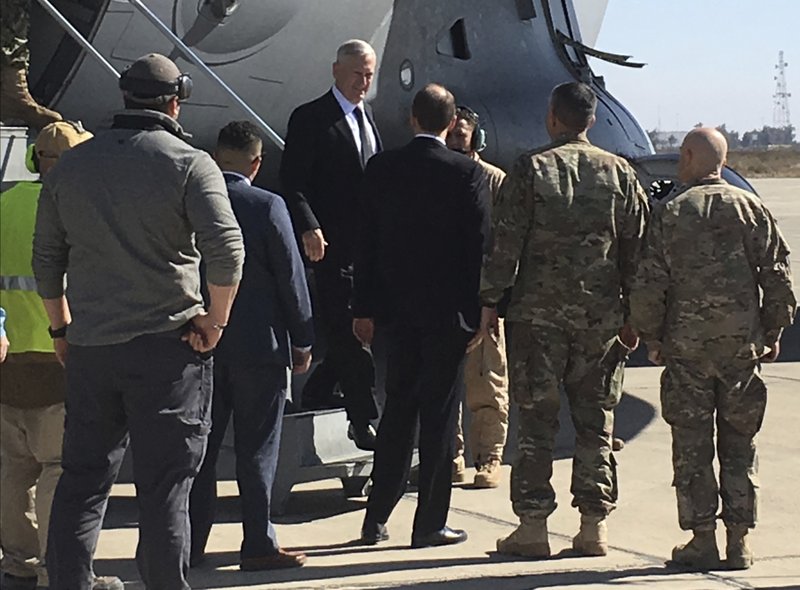BAGHDAD -- U.S. Defense Secretary James Mattis said Monday that he believes that U.S. forces will be in Iraq and in the fight against Islamic State militants for a while, despite recent tensions between the two nations.
RELATED ARTICLES
http://www.arkansas…">Trump picks security adviserhttp://www.arkansas…">Pence to EU: U.S. support steadfast
Speaking at the end of a day of meetings in Baghdad with military commanders and Iraqi political leaders, Mattis said he is open to any request from his military commanders to assist in the battle to retake Mosul and to start a battle to oust the Islamic State from the base of its so-called caliphate in Raqqa, Syria. He would not provide details.
Despite President Donald Trump's past threats to take Iraq's oil and his attempt to impose a travel ban that includes Iraqi citizens, Mattis said his meetings with Iraqi leaders underscored the partnership the U.S. has with the Iraqis.
He said there's no doubt that "the Iraqi people, the Iraqi military and the Iraqi political leadership recognize what they're up against and the value of the coalition and the partnership, in particular with the United States."
[PRESIDENT TRUMP: Timeline, appointments, executive orders + guide to actions in first 100 days]
His words come on the heels of his earlier declaration that the U.S. does not intend to seize Iraqi oil, distancing himself from Trump's threats, which had rattled Iraq's leaders.
Trump's oil threat and his inclusion of Iraq in the administration's travel ban have roiled the nation and spurred lawmakers to pressure Prime Minister Haider al-Abadi to reduce cooperation with Washington.
"I think all of us here in this room, all of us in America have generally paid for our gas and oil all along, and I'm sure that we will continue to do that in the future," Mattis told reporters traveling with him. "We're not in Iraq to seize anybody's oil."
Trump raised the prospect during the campaign, and he mentioned it again late last month during a visit to the CIA. He told the gathering there that "to the victor belong the spoils" and added, "maybe you'll have another chance" to take the oil.
Still, Mattis and Lt. Gen. Stephen Townsend, the top U.S. commander in Iraq, described an enduring partnership between the U.S. and Iraq.
"I imagine we'll be in this fight for a while, and we'll stand by each other," Mattis said.
Townsend, who was standing by Mattis, declined to say how long the U.S. will stay in Iraq. But he said, "I don't anticipate that we'll be asked to leave by the government of Iraq immediately after Mosul."
He added, "I think that the government of Iraq realizes their very complex fight, and they're going to need the assistance of the coalition even beyond Mosul."
Townsend also acknowledged that U.S. forces are operating closer and deeper into the fight alongside Iraq units as the battle to retake western Mosul entered its second day.
He said the change began in recent months during the successful fight to take back eastern Mosul and is happening more often.
U.S. special operations forces have been working with the Iraqis, offering advice and assistance, but initially they were only at the headquarters level.
More recently they have been moving closer to the battlefront, working with brigades, battalions and sometimes smaller units. They are generally with command and control units, not in combat on the front lines.
"We embedded advisers a bit further down into the formation," Townsend said.
Mattis' unannounced one-day stop in Iraq was his first as Pentagon chief and the first visit to the war zone by a senior member of the Trump administration. It comes as Mattis and his military leaders are nearing the end of a 30-day review of the Islamic State fight. He must send Trump a strategy to accelerate the battle in the next seven days.
A Section on 02/21/2017


